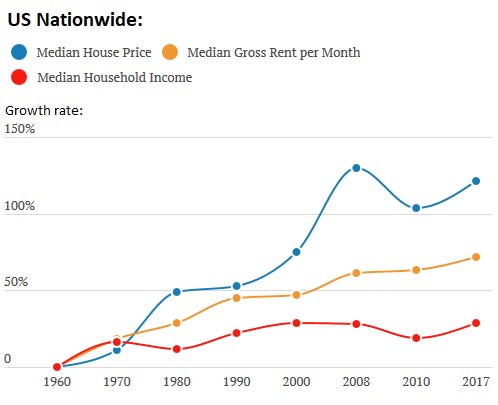Build Your Digital Property in the Creator Economy
Why Product Builders Are Quietly Replacing Content Creators
"First, earning power went from physical to digital. Now assets and security are going from physical to digital." – Naval Ravikant
1. Introduction: The New Digital Real Estate
Look at any major city's property prices from the 1960s and you'll find stories that sound impossible today. In the US, while median incomes have risen just 29%, rents have risen 72%, and house prices have soared 121% nationally, with places like San Francisco seeing a staggering 531% increase. Our parents' generation could buy property on a single income.

But while we've watched physical property slip out of reach, a new frontier of ownership has emerged. Not in real estate, but in digital real estate. The tools, infrastructure, and opportunities that were once controlled by tech giants are becoming accessible to individuals. Just as property created generational wealth in the physical world, owned digital platforms are becoming the assets of our era.
2. The Era of Digital Sharecropping Is Ending
We became digital sharecroppers through the attention economy without realizing it. Every piece of content we create pays rent to platforms we don't own and we bear a risk due to information asymmetry—platforms hold all the control over visibility and algorithms while we remain in the dark.
That 100,000-follower Twitter account you built?
Gone overnight when Elon changed the verification system and engagement algorithms post-acquisition. Years of community building, erased by a business decision out of your control.Your Instagram business reaching millions?
Meta cuts your organic reach by up to 90%, then asked you to pay for the same audience you built. Your followers are their assets, your content their collateral.That YouTube channel driving your revenue?
One content policy update, one mysterious "algorithm change," and your viewership drops 70%. Six figures of annual income becomes minimum wage overnight.
Each platform pivot is a lease termination. Each algorithm update is a rent hike. While we celebrated hitting follower milestones, we were really building equity for our digital landlords. They own the land. They own the distribution. They own the relationships we thought we were building.
3. The Great Digital Migration Has Begun
The attention economy that turned us into renters is showing structural damage:
But here's what's fascinating: as public platforms falter, private spaces are thriving.
Newsletter open rates significantly outperform social engagement
Private communities show higher retention than public platforms
Direct relationships are becoming more valuable than follower counts
This isn't a market crash—it's a mass migration. The cost to build your own platform is now less than a year's worth of social media advertising. Community tools have become sophisticated and accessible. Direct monetization options have exploded.
4. From Real Estate Agents to Architects
The first wave of digital creators were essentially platform agents – experts at showing and selling space on someone else's property. Like real estate agents working purely on commission, they mastered the art of the platform game: optimizing for algorithms, chasing trends, and monetizing through sponsorships and affiliate links. They knew how to drive traffic, but they were building wealth for their platform landlords.
Today's creators are becoming architects of their own platforms. The technical barriers that once forced creators to build on existing platforms have crumbled:
Custom payment systems that once required months of development now launch in minutes
Community platforms that needed engineering teams can be built by individuals
Marketing tools that demanded technical expertise now run on visual interfaces
Data analytics that cost thousands are available out of the box
AI enabling scalable and high-quality communication and automation
But the real shift isn't just in the tools – it's in the mindset. Instead of mastering temporary platform tactics, digital architects build systems that compound in value. Rather than chasing followers, they're building assets. Where others see content treadmills, they're designing scalable systems.
5. The Product Builder's Advantage
While most creators are still learning to be digital real estate agents, product-minded people have been quietly mastering the art of digital architecture. This mastery comes from five core advantages that product thinking brings to building digital assets:
Systems Thinking: Where creators see content calendars, product people see user journey maps. We design scalable systems that work even when we're not actively manning the construction site.
User Psychology: Platform algorithms once handled retention for us. On owned property, you need to engineer your own engagement mechanisms. We build spaces people want to return to.
Data Architecture: Your owned platform isn't just a content repository—it's a data generation engine. Just as property developers understand location analytics, we build funnels that generate actionable insights.
Experience Design: The difference between a house and a home is in the details. We create intuitive navigation patterns and seamless user flows that retain attention without platform-aided discovery.
Technical Foundation: Smart property developers know when to hire specialists and when to handle things themselves. We evaluate tools, make build-vs-buy decisions, and construct reliable technical stacks that scale fit-for-purpose.
6. Building Property That Appreciates
Here's where product thinking creates an unfair advantage: we can actively accelerate the appreciation of our digital property. Every system improvement compounds. Every feature launch builds value. Every audience interaction strengthens the foundation.
When you own your digital property, you're building infrastructure:
Your platform becomes an appreciating asset, not a rent payment
Your audience relationships are direct, not mediated by algorithms
Your data provides compound insights, not just fleeting metrics
Your content builds lasting value, not temporary engagement
This infrastructure approach transforms your digital presence from a series of posts into a valuable property portfolio. Each piece reinforces the others, creating a network effect that can’t be replicated on rented platforms.
7. The Investment Opportunity of a Generation
Today's digital ownership tools are like the affordable lots in emerging neighborhoods of the 1970s. The initial investment isn't primarily financial—it's the courage to build on your own land rather than rent on someone else's.
The pioneers of this digital land rush aren't waiting for perfect conditions. Instead, they're taking strategic steps that compound over time:
Converting social audiences into owned email lists
Transforming content workflows into productized services
Building community platforms that others can build upon
Creating digital assets that appreciate without platform dependencies
These are foundational moves to claim your place in the digital property market before it matures.
8. Your Next Move
The question isn't whether this migration will happen—it's whether you'll stake your claim now or wait until the prime digital real estate has been claimed.
Your path to digital property ownership starts with three concrete steps:
Choose Your Foundation: Pick one platform you'll fully own (website, newsletter, or community)
Build Your Asset: Convert one piece of platform content into an owned asset
Design Your System: Create one retention mechanism that doesn't depend on algorithms
Today's digital frontier is like those 'impossible' sounding real estate stories you may have heard from your grandparents—except this time, you're standing in the right decade, looking at empty lots, with the tools to build in your hands.
Thanks for reading!—Found value in this? Three ways to help:
Like, Comment, and Share—Help increase the reach of these ideas
Subscribe for free—Join our community of makers
Become a paid subscriber—Support this creative journey
Keep Iterating,
—Rohan
→ Connect with me on LinkedIn, Bluesky, Threads, or X.
Still here? I’d appreciate you taking a second to answer this quick poll for feedback:






Digital real estate that you own is becoming more valuable with every passing day. It's not just about owning a domain name though. Domain squatting isn't good enough. Value on the internet is measured by distribution and community.